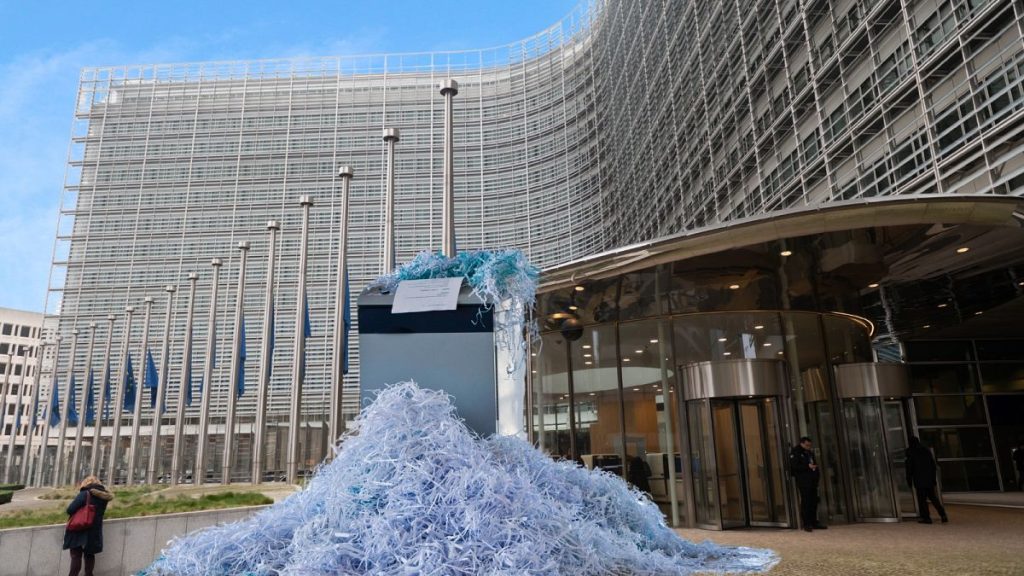Summarize this content to 2000 words in 6 paragraphs in Arabic
Euronews went dumpster diving—not literally, don’t worry—through the EU Commission’s discarded legislation to see what’s been scrapped as outdated, stale, or just plain unworkable. Somebody had to do it, and here’s what we found.
ADVERTISEMENTLast week, the Commission rolled out its 2025 work programme—essentially a to-do list for the year ahead.There weren’t many surprises: we already knew about things like the Competitiveness Compass and the Clean Industrial Deal, with the sole exception of seasonal time changes which had been scrapped in earlier drafts, now back on the table.What really stands out, though, is what the Commission has decided not to do anymore: 37 legislative proposals have been officially shelved, in an effort to cut red tape and clear out stagnant projects.Some of these simply no longer make sense—like a cooperation agreement with the Afghan government, which hasn’t existed since the Taliban took over in 2021.But while some other files were doomed from the start, others will likely spark debates over whether they should be revived in a different form.Euronews has curated the most interesting (and controversial) legislative proposals stuck, outdated, or too complicated to agree on, that are now getting tossed.No new AI liability rulesOne of the biggest surprises in the Commission’s discard pile is the AI Liability Directive, originally proposed in 2022 to update rules on damage caused by AI systems. The idea was to ensure consistent protection across the EU, but according to the Commission, there’s “no foreseeable agreement”.German MEP Axel Voss (EPP), who was working on the file, told Euronews that scrapping it was a “strategic mistake”, though the Commission left the door open to revisiting the issue in a different format.E-privacy reform gets shreddedThe long-stalled overhaul of EU data privacy rules, first proposed in 2017, has also been tossed out. It aimed to restrict surveillance ads, rein in Facebook-style pay-or-consent models, and protect encrypted communication.Despite negotiations dragging on since 2021, progress has been non-existent; despite online rights activists calling to revive talks, the Commission thinks the proposal is outdated given recent tech and legal developments.Anti-discrimination droppedA proposal dating all the way back to 2008, aimed at extending anti-discrimination protections beyond the workplace, has officially been ditched. The directive sought to ensure equal treatment regardless of age, disability, sexual orientation or religious belief.It has been blocked in the EU Council for years, and now the Commission says there’s “no foreseeable agreement”. Green MEP Alice Bah Kuhnke, rapporteur on the file at the Parliament, called it “a scandal”, urging the EU to step up and push for fresh, ambitious legislation in the face of global backsliding on diversity and equality following recent decisions of Donald Trump’s administration.Patent reform hits a wallAnother contentious removal is the so-called “patent package” which included proposed updates on standard-essential patents (SEPs) and supplementary protection certificates (SPCs).ADVERTISEMENTThe Intellectual Property Judges’ Association recently warned that these changes could undermine the EU’s Unified Patent Court (UPC), creating inconsistent rulings and unnecessary legal battles.Even António Campinos, head of the European Patent Office, had urged a pause in an interview with Euronews—well, now it’s been paused indefinitely.Finance rules “afuera!”Several finance laws have met the same “Afuera!” fate that Argentinian President Milei famously dealt with various government departments in his recent state restructuring.Among the more obscure casualties is a law on the “third-party effects of assignments of claims”. In plain English, this was about helping companies get liquidity through mechanisms like factoring and collateralisation.ADVERTISEMENTMore notably, the Commission’s 2017 plan to transform the European Stability Mechanism (ESM) into a European Monetary Fund (EMF) has been scrapped, citing a lack of agreement. Some of its ideas have been absorbed into a separate revision of the European Stability Mechanism treaty, though.Less transparency in EU decision-makingBad news for those who like to keep an eye on EU affairs: rules meant to improve public access to EU documents have been shelved, with no progress since 2011.Another niche but significant casualty is the reform of comitology—an obscure EU term for the approval of EU laws.ADVERTISEMENTBefore the Treaty of Lisbon, comitology was a key decision-making tool that did not require the European Parliament scrutiny. It still survives in certain areas, namely implementing acts of basic EU rules such as directives and regulations.The Commission tried to fix this back in 2015, but after years of deadlock, they’ve given up. This means that on certain issues (such as approving glyphosate herbicide), the Parliament will still have little to no say.
rewrite this title in Arabic Sorting through euro trash: What proposals has the Commission scrapped?
مقالات ذات صلة
مال واعمال
مواضيع رائجة
النشرة البريدية
اشترك للحصول على اخر الأخبار لحظة بلحظة الى بريدك الإلكتروني.
© 2025 جلوب تايم لاين. جميع الحقوق محفوظة.













